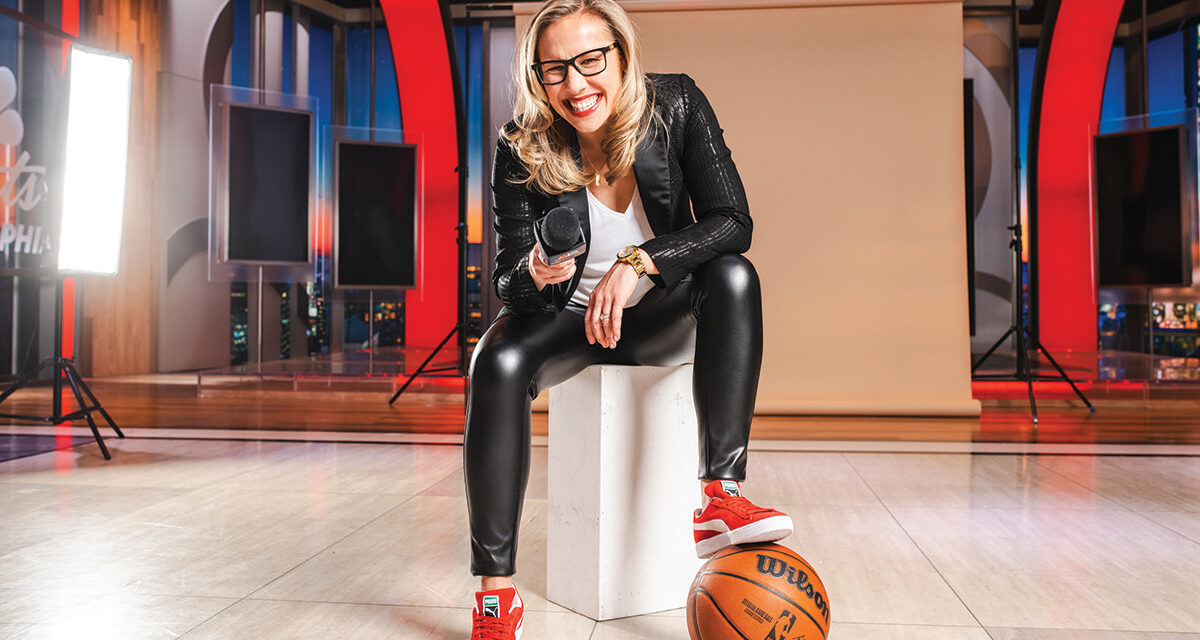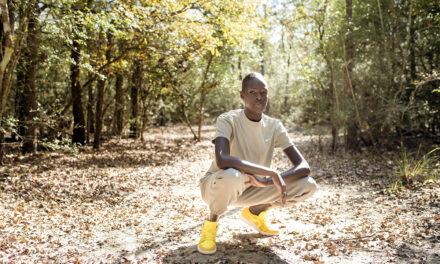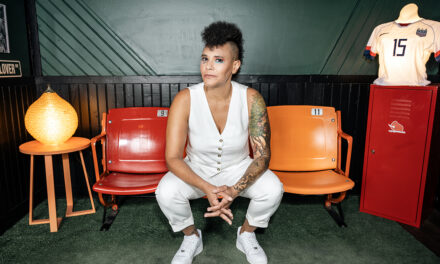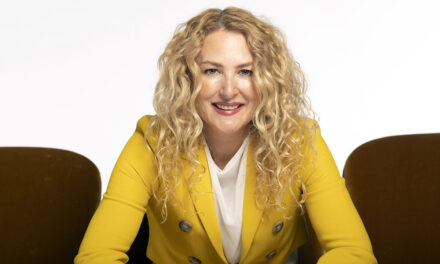Three years into her dream job, Philadelphia 76ers television play-by-play announcer Kate Scott is already immersed in the team, the city, and the role of a lifetime. She just hasn’t stopped having fun long enough to notice.
They talk about me being an inspiration. But that, in turn, inspires me and motivates me to get through the bad days and to work even harder.
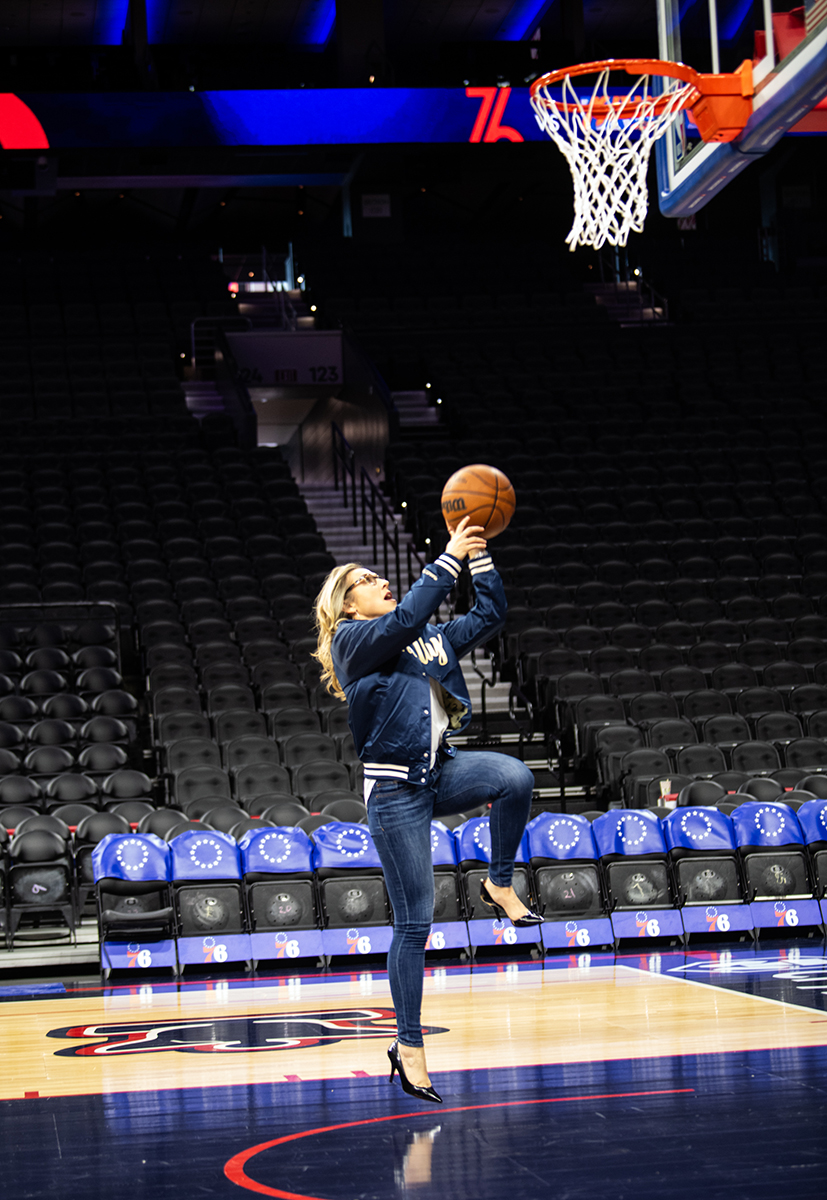
Dick Ramage didn’t know what to do about Kate Scott. The end of the Clovis High School tennis season was nearing, and Ramage had to dole out his team awards. Scott deserved recognition. Even though tennis wasn’t her primary sport—that was soccer—she approached it with a ferocity and tenacity her coach loved. Lacking the same country club-groomed background of her peers and opponents, she used her sheer athleticism to break their will. Draw them to the net. Lob a shot over the head. Exhaust them, beat them, prove to them that even though she didn’t fit in their neat little box, she was better.
Except Scott was only a sophomore. So, Rookie of the Year was out. Upperclassmen merited MVP honors. Which left Ramage with just one choice: he made up an award. “He called it the Never Satisfied Award,’’ Scott says with a chuckle.
It is a rare off day for Scott, the 76ers TV play-by-play announcer who, when she’s not reporting for the regularly scheduled 82 NBA games, opts to add other things to her plate. A national team soccer game. A preseason football game. She’s perched in front of a bookshelf stuffed with the collection of a career, including the impressive flex of an Emmy (a regional award she won while working as a sideline reporter for the MLS’ San Jose Earthquakes). She does not, she laments, have her Never Satisfied Award. Maybe, she says, it’s stuffed in the back of her parents’ Clovis, CA, garage.
What it seemingly lacks in importance it makes up for in accuracy. If ever two words should be plastered on an award bearing Kate Scott’s name, it is “Never Satisfied.” In the parlance of the outside world’s measuring stick, Scott has arrived. She is a full-time play-by-play announcer for one of 30 NBA teams, one of just two women to hold that post. She’s called NFL, NHL, World Cup, Olympic hoops, and Division I college football games (the only woman to hit for that particular sports slam). Despite a comparably late start, she has climbed and clawed and worked her way up the ladder to where, at 40, she ranks as one of the most well-respected people (man or woman) in her profession and has (largely) won over a rather difficult and opinionated fan base in Philadelphia.
She could, if she wanted to, just chill. Scott, who a week earlier caught a late-night train to Connecticut to call a U.S. Women’s National Team game at 10 p.m. on her off day, considers the foreign concept briefly. “I don’t think I’ll ever feel like I made it,’’ she says. “It’s how I’m wired, and I think that’s a great thing. If I stop trying to get there, then I stop growing.’’
California Dreaming
Scott grew up in Clovis, just outside of Fresno. Aside from Kate, no one in the Scott household would rank as a particularly avid sports fan. Scott, however, sped past avid and went to rabid. She played tennis, soccer, and basketball, and ran track. Her parents neither pushed nor discouraged her; they simply asked what gear she needed.
It was a subtle thing, a parenting move made more out of simplicity than intention. Yet it planted in Scott a seed that grew into a lifelong motto: Why not? It never occurred to her parents that Scott couldn’t or shouldn’t try sports, just like, years later, it never dawned on Scott that she shouldn’t be able to pursue a sports broadcasting career.
She just did it.
Her playing career framed her approach to her professional one. Scott used to play up in travel soccer, her 14-and-under team going head to head with 17-and-unders. Her coach did it purposefully, knowing that it would force them to work collectively as a team but also recognizing that when their turn came, when they were the under-17 team, it would be that much easier. It honed traits she already had—perseverance and determination—while also developing her resilience.
Some might call it pluck, but that seems a little too quaint for Scott. She is grit and tenacity, more a “Oh yeah, watch me,” than a “gosh darn.” She does not, that is to say, hear the words “can’t” or “won’t” and think like the little engine. She’s more of a locomotive, steamrolling ahead. “My innate response to a challenge has always been, bring it the f– on,’’ she says with a laugh. “That should probably be the title of my book one day.’’
Her own athletic dreams died hard and young, courtesy of a knee injury. Instead, Scott went to the University of California, Berkeley, and got her sports fix by writing columns for a Cal-centric magazine and website. She also became the Bears’ first female “mic” man (leading cheers at football and basketball games), approaching the job much the same way her parents considered her sports pursuits. Well, why not me? she asked. A gig running a student segment on a local television affiliate led to her first real job.
After Scott graduated in 2005, a producer of the show called and asked if she wanted to call some area high school football games. It was love at first play call. Soon Scott was doing a little bit of everything, including TV reporting for Cal football and hosting the Bears’ postgame radio show. She followed the same pattern after landing a full-time job with KNBR, the radio affiliate for the San Francisco 49ers, Giants, and Golden State Warriors. Along with doing sports updates and filling in for host spots as needed, she found work as a sideline reporter for the professional soccer team in town, reported for the minor league baseball team, and did some anchoring work when the NBC affiliate needed a pinch hitter.
It became an unintentional mantra, a need to never say no, that she still has not quite shaken. “I have just had to be more in every way,’’ Scott says. “More willing to say yes to every assignment and more resilient when co-workers doubted me or purposefully tried to make things difficult for me. More empathetic and more willing to understand that people are going to have reactions to my existence and my presence, and it really didn’t have anything to do with me. I feel like I’ve had to prove myself every single day, again and again and again.’’
It can be exhausting—and still is, on occasion, Scott admits. She has encountered her share of Neanderthals and trolls, some implying she only has been given jobs because of her gender, others opting to simply discredit her because of it. To say it doesn’t sting would be a lie. What Scott has learned, however, is it doesn’t matter. There are some people she will never win over. Instead, she chose to concentrate on the opinions of the people who matter—her peers, her employers, and the athletes and coaches she’s covered.
With them, she’s found that it’s her work that matters—and that’s something she knows she has covered. “The prep fills me up and motivates me; the game is icing on the cake,’’ she says. “The moment [the audience] sees, that’s the fun part. I love the digging in.’’ It is that, the embracing of the actual job as opposed to worrying what people think about how she does it, that has afforded Scott opportunities that still blow her away.
• In 2016, Scott became the first woman to call an NFL game on the radio, when she worked two preseason games for the San Francisco 49ers.
• During a stint with the Pac 12 Network, she became the network’s first woman to call a college football game.
• In 2020, she was part of the first all-women broadcast crew for a U.S.-broadcast National Hockey League game.
• A year later, she set another first, as the first woman to call men’s Copa America and Gold Cup soccer for Fox Sports.
• In 2021, the 76ers called, making Scott one of only two women to serve as the full-time “voice” for a major men’s professional team.
On the rare opportunity she pauses to wonder how she got here, Scott realizes she still doesn’t have a real answer. “I didn’t see a path,’’ she says, “because this path didn’t exist. None of this existed.’’
Here is the thing about being a pioneer, or at least being viewed as one: everyone views the breakthrough as the apex, when it’s just the starting point. Scott already has traversed a pretty tall ladder, but she’s hardly out of rungs. That old tennis coach indeed knew a thing or two about his athlete. Scott will work the Seattle Seahawks preseason games again this year and riffs about maybe one day landing a national play-by-play gig. A woman has never called a Super Bowl. Could she? Who’s to say no?
Not that she thinks she’s perfected her current job. Scott is a relentless self-critic, though she tries to be constructive about it. She’ll listen to other announcers that she admires to hear how they called a big shot or controversial play and try to learn. Recently ESPN’s Dave Pasch served as the network’s play-by-play voice for a Sixers game that Scott naturally called, too. She purposefully went back to critical points to see if Pasch said something differently, or better. For the record, he did not.
Scott also solicits feedback from her peers. Kevin Harlan, one of the play-by-play voices for the NBA on TNT and the NFL on CBS’s play-by-play announcers for college basketball and the NFL, told her to regulate how quickly she spoke, which sounds a lot easier than it really is. There is, with excitement, a natural tendency to talk faster; Scott’s job is to inject the excitement without speeding up her words. Legendary hockey announcer Doc Emrick reminded her that she always has more time than she thinks she has, and that there are pictures to go with what she’s saying. She needn’t fill every void with sound.
Three years in with the Sixers she admits—albeit reluctantly—that she’s not only better than when she’s started, she’s actually pretty good. “I know now that I belong here. I proved myself,’’ she says. “Now it’s the intricacies of how do I improve in the guts of the game, in the big moments? And also to take a deep breath and remind myself that I’ve earned this, so go have some fun.’’



“The prep actually fills me up and motivates me. The game is icing on the cake. The moment the audience sees, that’s the fun part.”
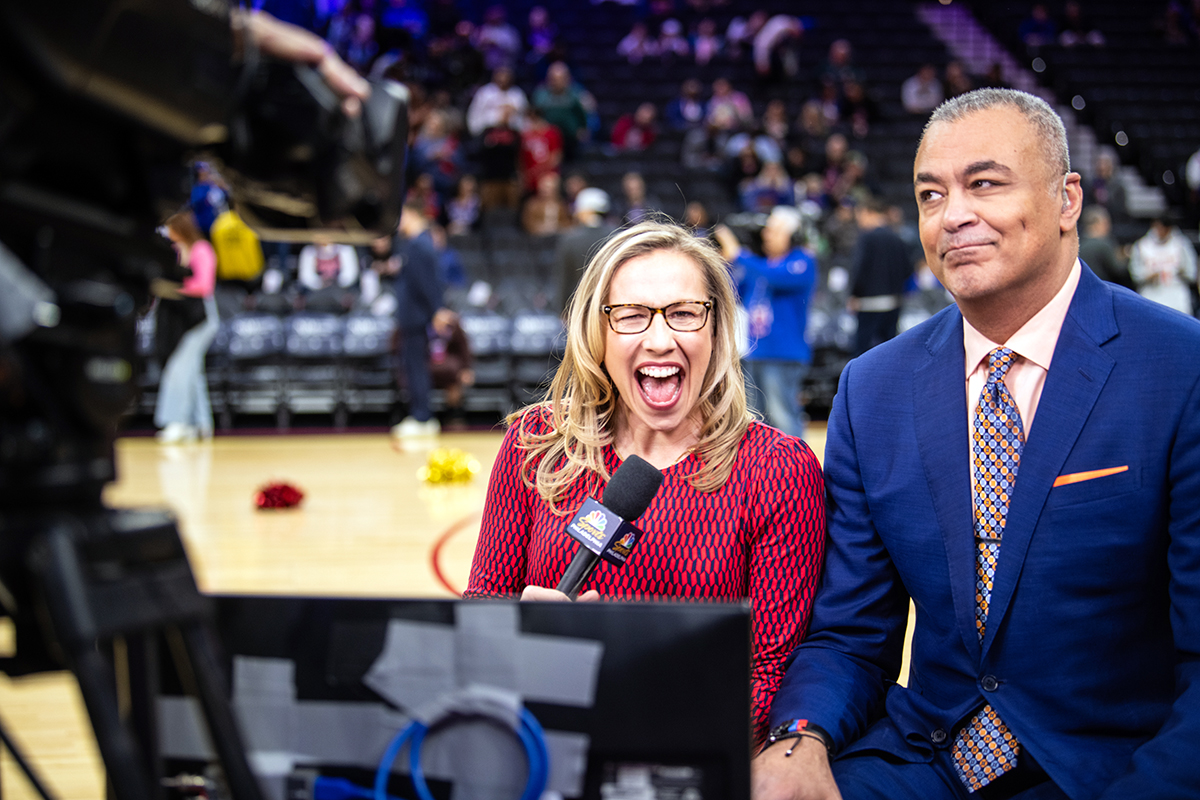
Philly, Philly
Scott and her 76ers predecessor, Marc Zumoff, joke about the biggest challenge in accepting the Sixers job. “I’m very open that I’m a gay woman. The best way to talk about my differences is for me to lead about them,’’ she says. “But those were okay for Philly to accept it’s the fact that I’m from California that was the hardest thing.’’ Yet the notoriously parochial city has come around to Scott in large part because she imbues that which the city truly values: hard work, toughness, and a healthy dose of “come at me.” The tagline for the social media of Scott’s employer, NBC Sports Philadelphia, reads, “You don’t like us. We don’t care.’’
“That’s me since I was a little girl,’’ Scott laughs.
Scott credits NBC and the Sixers for having the courage to hire her. It was, she knows, a risk. Yet she laughs off the criticism that she only got the job because she’s a woman. “There are so many people’s jobs on the line based on how I do,’’ she says. “There’s no charity hires at this level.”
Scott also knows that nothing she does is in a vacuum. She refers to herself as a member of “Team Other.’’ Scott does not personally consider either her gender or her sexual orientation a big deal, but to think of it as a nonissue would be naive. As she’s grown into her profession, Scott has learned how to flip that narrative on its ear. Rather than worry about the critics and cynics who want to turn her gender and sexuality into a negative, she considers the people who are empowered by it.
It’s the next roster of Team Other, the people who don’t look like or love like or sound like the norm, that Scott finds herself thinking about. She has received notes from people and been stopped by fans who thank her. Not all are women or gay. Plenty aren’t even interested in a career in broadcasting or sports. But in Scott they see someone to emulate. “They talk about me being an inspiration,’’ she says. “That in turn inspires me and motivates me to get through the bad days and to work even harder.’’
Team Other is growing. There is far more diversity in sports broadcasting—in gender, in race, in ethnicity, in sexuality—than ever before. That fact is helping Scott to say no a little more these days. In her view, it is her responsibility to decline opportunities and instead suggest someone else; to make room and opportunities. It still does not come naturally, this easing off of the gas pedal, but the fact that doing so can help the greater good makes it a little easier.
On a walk recently with her wife, Nicole, and their dog, Piper, Scott discussed this very thing. How could she do a better job at editing and narrowing her own life? Can she find the sweet spot where she could work hard but also enjoy what she’s accomplished?
As she recounts the conversation, she suddenly stops and smiles. “I’m calling another soccer game tomorrow,’’ Scott says sheepishly.
As ever, she remains the winner of the Never Satisfied Award.


